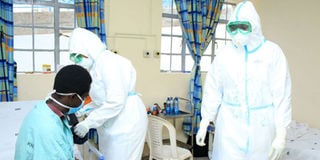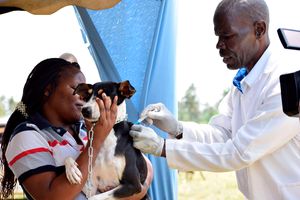Push for regional research networks to tackle disease outbreaks

Medics attend to a Covid-19 patient in an isolation ward at the Kenyatta National Hospital's Infectious Disease Unit in Mbagathi, Nairobi.
What you need to know:
- The Seventy-third session of the World Health Organization Regional Committee for Africa brought together over 1,000 health experts to discuss and agree on key measures to address the region's health challenges.
- The meeting highlighted the need to focus on supporting regional research and development for health rather than building new vaccine manufacturing facilities in developing regions to strengthen regional resilience.
In the wake of Covid-19, African countries are now pushing for sustainable regional research and development networks to ensure better access to vaccines, treatments and diagnostics.
Last week, the nations gathered in Botswana to draw lessons on how to better prepare for future pandemics and shocks; with the majority agreeing that it was time to make technologies and innovations accessible in Africa and other continents.
The Seventy-third session of the World Health Organization (WHO) Regional Committee for Africa brought together over 1,000 health experts to discuss and agree on key measures to address the region's health challenges.
The meeting highlighted the need to focus on supporting regional research and development for health rather than building new vaccine manufacturing facilities in developing regions to strengthen regional resilience.
WHO Africa Regional Director, Dr Matshidiso Moeti, said Covid-19 provided valuable lessons for the rest of the world, noting how agonising the struggle was for African countries to obtain sufficient supplies.
He quoted the UN Secretary-General Antonio Guterres, who stated that “the African continent’s response to the Covid-19 pandemic has provided valuable lessons for the rest of the world,”
Dr Moeti said the struggle to obtain sufficient supplies of key items for the response was no doubt unforgettable for governments and partners working with them.
She mentioned that WHO was working with member states in the African region to boost their pandemic preparedness response capacity from the community level.
Dr Soumya Swaminathan, former chief scientist at WHO, indicated that during Covid, countries largely relied on market dynamics to drive research, manufacture and marketing, resulting in highly inequitable access and preventable deaths, particularly in developing countries.
“Our proposal that centres on equity from the start would give researchers from developing countries a greater ability to quickly and collectively contribute to solutions to infectious outbreaks in their regions. When each region has that ability, the whole world is better protected from pandemic threats, which are only going to increase due to climate change.”
Their sentiments were echoed by a new paper published in the Lancet urging countries to stop epidemics before they become pandemics; with emphasis on sharing technologies and know-how on preparedness and response.
“Many of these technologies have been available for decades now and others have been developed with public funds. It’s time to make them available in Africa and on other continents,” says the paper.
The authors indicated that pandemic preparedness requires a rethink of equity to concretely include research and development and access to technologies.
“Time and again, developing countries are left waiting for tools like vaccines developed by others, while wealthier countries produce and access them first,” said the Helen Clark, former co-chair of the Independent Panel for Pandemic Preparedness and Response.
“The deadly lessons from Covid demand transformative change, starting with action to ensure that all regions have the technology and capacities required to develop products that stop outbreaks before they spread worldwide. That’s not only equitable, it’s strategic.
“In the 21st century, given available technologies and in the wake of a pandemic that has led to some 24 million excess deaths, there should be no question that we need a new model, one that fully empowers all regions to be self-reliant,” said Dr Amadou Sall, the director of the Institut Pasteur de Dakar, Senegal, one of the few African vaccine research and production sites.
The experts and countries have since joined hands to support regional and sub-regional research and development hubs led by local scientists, equipped to adapt established technologies without intellectual property restrictions and produce vaccines, treatment and diagnostics for new or re-emerging pathogens.
The authors call this ‘last-mile innovation.’
“In outbreak control, speed and versatility are of the essence, so having the ability to rapidly adapt the most suitable existing technology to local needs is critical,” said Dr Els Torreele, the lead author, adding that “the opportunity for ‘last-mile innovation’ will let researchers develop and produce products people can use, where they live, for the outbreaks in their regions.”
Petro Terblanche, professor of Health Sciences, indicated that by making technologies accessible, researchers can develop vaccines and make them accessible to every country for pandemic preparedness.
“If, for example, the mRNA technology platform is a shared source of knowledge and technology and is made accessible through networks of collaboration, researchers can innovate and develop vaccines that address local or regional health needs and are suited to optimal delivery into local and regional health care systems,” he said
“The public sector is already investing billions in research, which is then often sold or handed out to the private sector who decide whether or not to develop products based on profit potential. Tools to protect lives and stop outbreaks from crossing borders must be common goods and must and can be funded with that mindset,” said Dr Joanne Liu, a Canadian paediatrician and former international president of MSF.
The paper argues that many of the development banks could finance research and development for the common good rather than just vaccine manufacturing and distribution through a market approach.
One of the authors of the papers, Carolina Gómez, said: “Collaborative efforts rather than competition is needed to build strong regional research hubs, clinical trials, and pharmacovigilance networks.”
"The future of vaccination must start with vaccine equity for ethical and public health reasons.”





